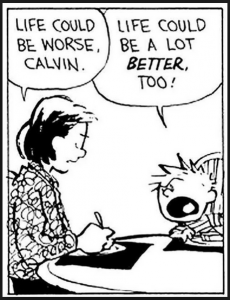This is the saddest thing I’ve read today: “If you survey American parents about what they want for their kids, more than 90 percent say one of their top priorities is that their children be caring. This makes sense: Kindness and concern for others are held as moral virtues in nearly every society and every major religion. But when you ask children what their parents want for them, 81 percent say their parents value achievement and happiness over caring.” So write Adam Grant and Allison Sweet Grant write in “Stop Trying to Raise Successful Kids,” an article in the December 2019 issue of The Atlantic.
If your kids don’t know that kindness is the most important quality of a human being, then you’ve failed as a parent. Prizing the attainment of admiration from others and believing in the innate primacy of your own happiness above the well-being of others leads to a deadening of empathy for and lack of awareness of the situations and needs of others. Devaluing kindness and decency and elevating selfishness and disconnection from others has brought the United States and the United Kingdom to their current damaged and dangerous states.
The Grants continue, “Perhaps we shouldn’t be surprised, then, that kindness appears to be in decline. A rigorous analysis of annual surveys of American college students showed a substantial drop from 1979 to 2009 in empathy and in imagining the perspectives of others. Over this period, students grew less likely to feel concern for people less fortunate than themselves—and less bothered by seeing others treated unfairly.”
Self-absorption and lack of ability to imagine the challenges that others face are what have led to a growing unwillingness to honor and support the social contract. Greed and a growing disdain for “outsiders” has led to the driving down of rates of taxation and an unwillingness to support the maintenance of national infrastructure. After decades of prosperity and expansion made possible by higher tax rates for corporations and for the wealthiest citizens of the U.S., we are now seeing enormous income disparities not experienced by previous generations. We face major infrastructure failures in U.S. cities, as well as increasing annual costs to save people from death and destruction from climate-change-fueled natural disasters such as hurricanes and wildfires. The increase in me-first (and me-only) thinking has put all of us at greater economic, emotional and physical risk.
A lack of desire to put oneself in others’ shoes leads to wariness and a willingness to justify not only lack of concern but outright cruelty toward those who find themselves in different circumstances. That’s why we now have public schools actively shaming poor children whose parents can’t afford to pay school lunch bills, immigration authorities kidnapping babies and confining them in cages with no record of who or where their parents are, and thousands of other well-publicized examples of people being marginalized, demonized, even left to die with widespread social approval.
Interestingly, in studies of the countries rated as the happiest in the world, researchers find that the countries that rate highest in such metrics also have the world’s happiest immigrants. The positive and welcoming treatment of outsiders who enter into a society is strongly correlated not only with the immigrants’ happiness, but with the satisfaction, health, safety and economic prosperity of the society as a whole. Such societies view others not as outsiders with values deserving of disdain, but as valued new compatriots from whom they can learn and with whom they can find common ground.
The point of strength and influence is to extend one’s power to do good for the benefit of others as well as ourselves. The noblest goal is the use of one’s power (whether individual, corporate or national) to help others and lift them up, to give them reason for hope, to help them see that they and their needs are reflected in our eyes. Happily, following through on that lofty goal actually brings greater happiness, prosperity, and longevity over all on both a personal and society level. Such socially oriented thinking has been proven to increase happiness and satisfaction, and to raise the safety and prosperity of others within society. And that’s what life is about. The rest is just glitter and dust.
Photo by Matt Collamer on Unsplash


